Just like it was a few months prior, the KLM plane from Amsterdam to Johannesburg is almost completely empty. My two traveling companions, plus myself, make up a third of the passengers aboard the Boeing 777. We can take any seat we like, as long as it’s not in First Class, of course.

Last time, the purpose of my trip was a plains game safari. A lifelong dream come true. I highly recommend it.
This time, I’ve traveled at the request of a game reserve to teach emergency rescue and medical techniques to Zulu game wardens. Their critical fight against commercial poaching is a dangerous one that can leave them outgunned and injured, or worse. They need all the help they can get.
So as much as I enjoy being here, I doubt I’ll hunt this trip. I didn’t even bring a rifle. Well, I packed my longbow, just in case. But I certainly have no intention of hunting zebra. Then again, I had no intention of hunting one last time either.
The zebra was Mike’s dream hunt, not mine. Like everyone planning a safari, my hunting partner and I had made lists of the animals we most wanted to hunt in South Africa. Whereas the Blue Wildebeest topped my list, Mike’s number one was the Plains Zebra.
For me, the Zebra was just another horse of a different color. For Mike, it was as Africa itself. Untamed. Exotic and powerful. The zebra didn’t exist in the New World. It didn’t exist in the modern world. It couldn’t. So Mike went to it. His reasoning was sound, and his excitement infectious.
And yet, despite all that excitement, a full week later, no zebra. It wasn’t for lack of trying.
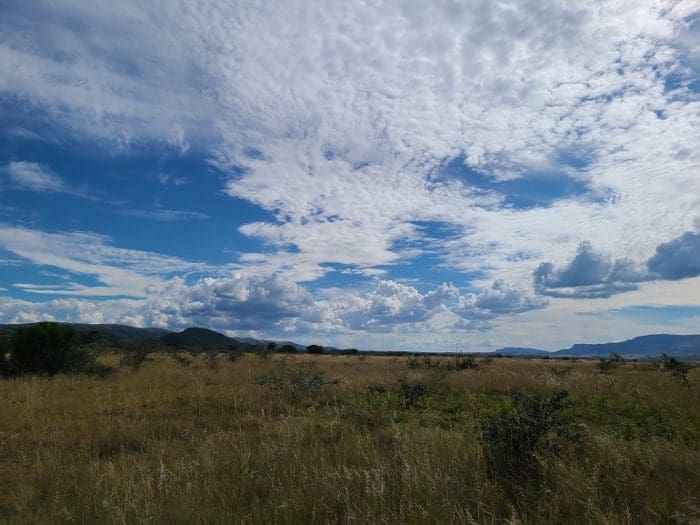
We had been hunting with NB Safaris and guided by George Nell in the plains north of Pretoria. The wary herds simply kept moving. And moving, and moving…always out of range. It turns out, that’s what herds do.
Mike had taken his safari preparation seriously. His rifle was a very capable Ruger M77 Hawkeye African chambered in .375 Ruger. With ammunition prices at record highs, Mike had spent a small fortune putting hundreds of rounds through the gun in order to perfect his aim. If any animal was within 250 yards, Mike was going to make that shot.
The zebras stayed about 400 yards away. The plan was to sneak up through the brush to the edges of fields, find a good stallion, and put him down with a solid shot from cover.
That plan didn’t work. As they say, “the plains have 1,000 eyes.”
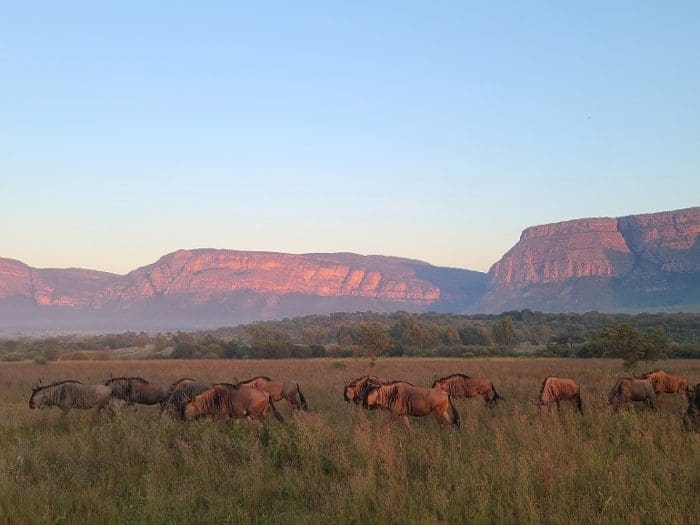
Everywhere we spotted the zebra, some other animal spotted us and alerted before we could get in range. Wildebeest and ostrich were apparently on contract by the zebras, as they stubbornly place themselves between us and the herd at every opportunity, and I’d already shot my wildebeest.
South Africa has a particularly diligent aviary species. We learned it was called the “Go-Away” bird for good reason.
At one point, we actually thought we had a chance at the herd. We took our time and, crouching down, we quietly covered several hundred yards, keeping a small group of trees between us and the zebra. We couldn’t have been more than 200 yards from them when we reached the trees and readied for a shot.
That’s when we found out the tiny African grove was home to not-so-tiny African wasps. They expressed their displeasure. We ran for our lives. So did the zebra.
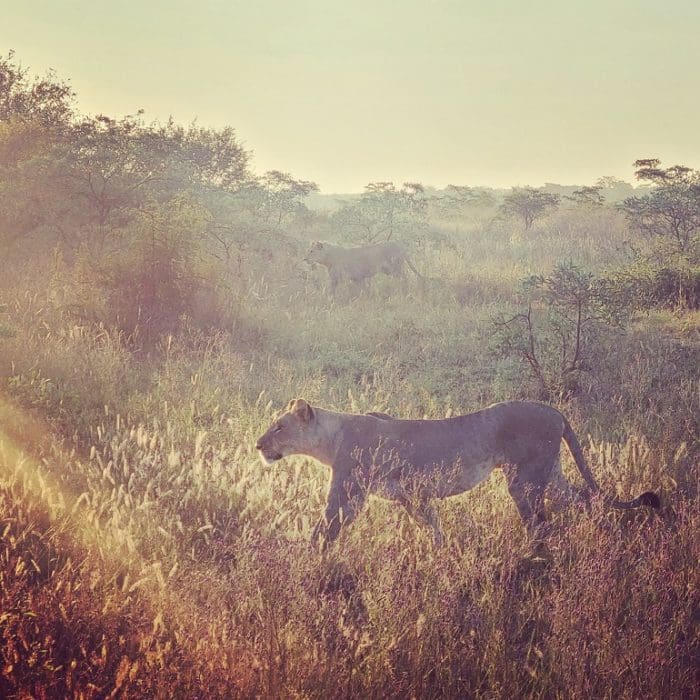
Of course, since this was a safari, and this was South Africa, there were many other opportunities that presented themselves while looking for zebra.
One morning, a herd of about 20 zebra thunder away from from us near the edge of a brush line. As I watched them go, our guide with NB Safaris, George, whispered to me “if you’re interested in the Hartebeest, you’re not going to find a better opportunity than that”.
Not 70 yards to our left, a lone male Red Hartebeest stood broadside, staring. I knelt, steadying my Ruger No. 1 in the crook of a tree. The Hartebeest turned and ran.
But he didn’t go too far. In the middle of a clearing, he stopped and faced us, barely 200 yards away. Seconds later, the animal and I were both kneeling. His knees had collapsed under him as I put a single round from my .375 H&H Magnum dead center through his chest.
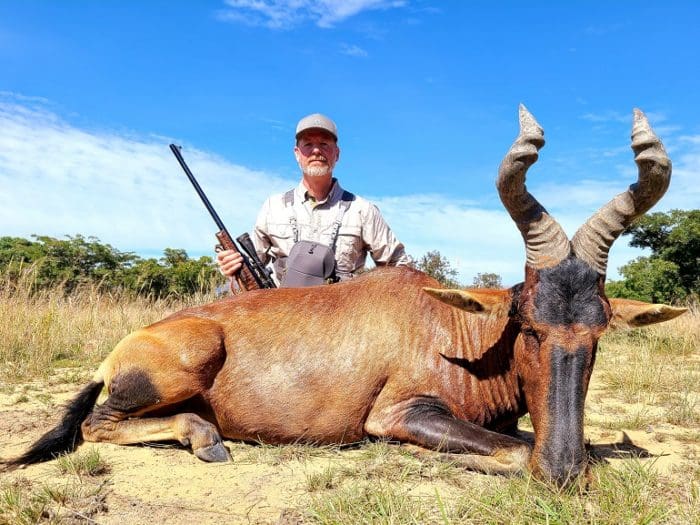
That same morning, Mike had spotted a white Blessbock with long, pinkish horns. As we were completely in the open, I hung back as Mike and George made a long, low stalk to get in range.
I didn’t see the shot, but I heard its report, as well as the unmistakable sound of a heavy bullet striking flesh. The 260 grain Nosler Accubond was generating over 3,500 ft/lbs of energy when it hit the Blessbock square in the shoulder. No follow-up was necessary.
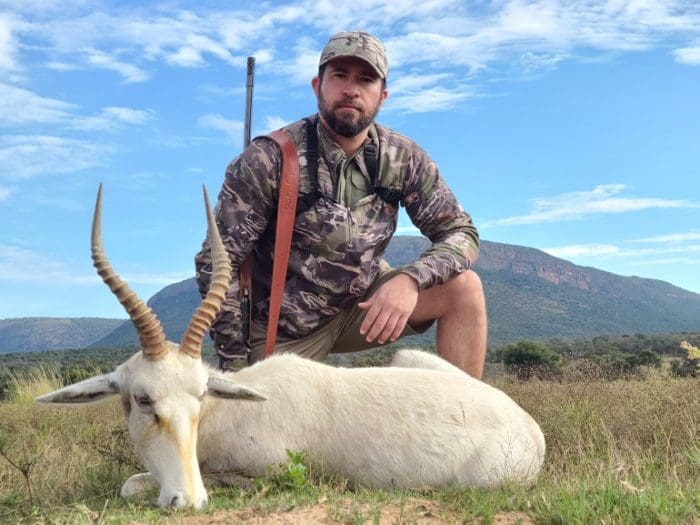
As we were more or less on open plain both times, it was easy to drive the truck right up and load the animals. We drove off to process them and get some lunch (local game sausage, grilled with mustard).
We started back at the zebra herds late that same afternoon. If it’s not one thing, it’s another, and this time, it was the giraffe that were problematic. Once they saw us, they followed us from a short distance away. Their height and attention was a like a flag waving “Look here! Danger here!” The zebra fled, again, now completely out of sight.
Frankly, it was worth it. The quiet, gentle animals blended into the bush shockingly well. I would have never guessed such a large animal could be so well camouflaged. If it wasn’t for their heads jutting from above the trees, we would never have seen them.
Since we didn’t want to shoot them and couldn’t shake them, we simply sat under a Mopane tree and waited them out. It was dark before they left. That sunset alone was worth the trip.
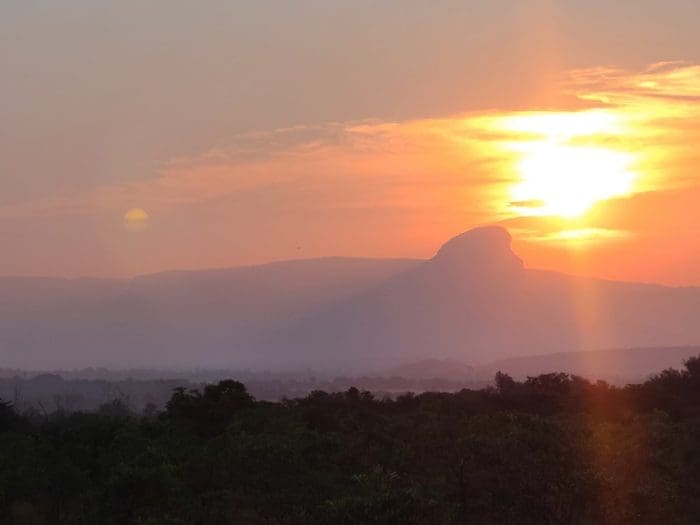
George had had enough of chasing the Plains Zebra, so he told us to get a good night’s rest and get ourselves ready. Tomorrow morning we were headed to the “proper mountains.”
The next morning, true to his word, we skipped the plains entirely. We drove right past annoyed ostrich and curious giraffe, heading up a winding mountain road. The goal was to get as high as we could and glass until we found a herd below.
It was a huge swath of land, but there were limited places to get water and if we found the herd, we could likely figure out where they were headed. If we were careful, we could maneuver into range sometime later in the day. This was a very familiar technique, as it’s exactly what I’ve used to hunt various sheep species with some success.
In the back of the truck, Mike, George, and I kept our eyes peeled down the mountain slope to our right. Without warning, the driver slammed on the brakes to avoid hitting the zebra herd as they darted past the hood. By the time we recovered ourselves, the small herd was far down the mountain, disappearing in the green canyon below.
Rifles slung, we followed.
Whereas in the days before we walked through endless plains and brush, now we were moving carefully down sharp ridges, placing our feet not on the red dirt that stained our shoes and clothing, but on hard chunks of boulder and solid rock. As we held onto withered brush for balance, we caught a few glimpses of stripes through our binoculars. Occasionally the sounds of hooves echoed as they skittered and ran across the stones below.
The zebra simply outran us. Not surprising. I mean, they are zebras. We gave up the chase when we heard them far to our right, well down the mountain. They had completed a semi-circle all the way around us, covering triple our distance, and they were still running.
I was the oldest of our group, and by a good bit, but my pride wouldn’t let me be anything but first to climb back up the mountain. By the time we got to the road, my burning thighs reminded me that pride was about all I had left.
With a little water and a little rest, and now back in the bed of the truck, we headed down the mountain road, hoping to intercept the zebra herd. Learning our lesson from earlier that morning, George reminded us all to look every direction, and Mike to keep ready to shoot. The opportunities would be few, and brief.
But immediate. It wasn’t five minutes later when, now creeping down the road, we saw a zebra. It was standing right on the edge of the road on the inside of a sharp turn. We could barely see it through the brush and George had some sharp eyes to pick it out. Mike carefully dismounted and got ready to fire.
Tucked into the brush and on the edge of a turn, we couldn’t tell if the zebra was male or female, the age, or anything other than the fact that it was a zebra. George whispered “hold on….”
The herd appeared. In an instant, materializing out of nothing but dust and thunder, hooves roared, not down the hill, but much closer. Within 30 yards of Mike, the herd came rushing toward us, paralleling the road. My brain was still registering their existence when George shouted “SECOND FROM THE LEFT!”
Mike swung the rifle 170 degrees, firing his Ruger just as the muzzle stopped. The first thing out of Mike’s mouth was, “I hit him.” The next thing out of Mikes’ mouth was, “I hit him?”
I thought the same thing. I barely got my eyes on his target when Mike shot, but I was 100% sure I saw a zebra take a hard fall before getting up and running again. But now I wondered. It all happened so fast. We’d spent days hunting these animals, and now within seconds Mike hit one. Or did he miss, and the zebra just stumbled while running down the mountain?
I was probably shaking more than Mike when I walked forward to where I saw the zebra stumble. It wasn’t far. The grass and plants were smashed down and there, plain as could be, was a long drop of blood the size of my thumb, and more close by. Mike didn’t miss.
The herd went left and down the mountain, but the splashes of blood showed one animal went right, backtracking but just a little bit more down in elevation and out of sight. The blood trail wasn’t hard to follow. Big droplets of blood were constant, making long streaks and teardrop shapes on the ground. He was still running.
Mike’s shot was true. Perfect, in fact. And yet, the zebra ran several hundred yards with his heart torn to bits. He died still running, with his mass plowing the ground as he fell. The old stallion’s body gave out before his spirit did.
Oh Father, when you call me, let it be so.
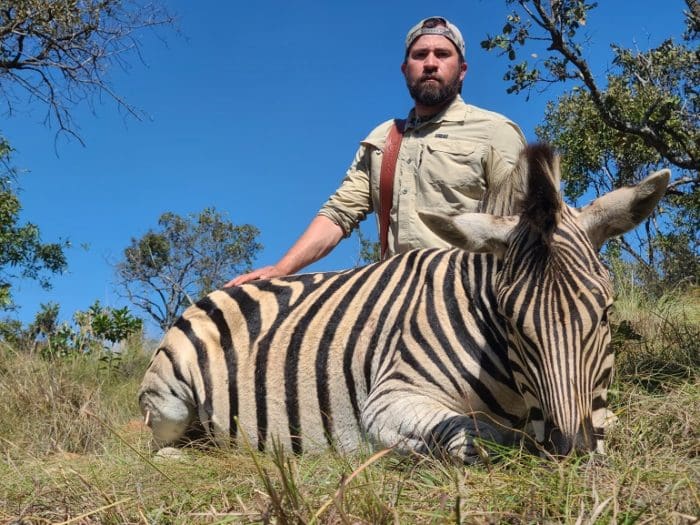
Mike’s shock dissipated as we went through the significant chore of getting the truck to the animal and loading it. It’s really much easier on open ground. By the time we had it loaded we were sweaty, dusty, a little bloody, and beat.
That night, we ate zebra tenderloins cooked over a wood fire. It was the best, sweetest game meat I’ve had in my life. Absolutely delicious.
Between bites, I let George know I wanted to be back in those mountains and back at the zebra. Tomorrow, it was my turn. He obliged.
The next morning, Mike cooked a zebra loin and buttered bread breakfast and we headed out. George figured we had run that heard pretty good, so we’d start on a different area of the mountain. This section of the property was a little lower, with trees big enough to provide some canopy overhead. It was also less developed, and we inched the truck along a dirt path rather than a dirt road.
Within just a few miles of where Mike shot his zebra, we were in what appeared to be an entirely different ecosystem. Small ponds dotted the landscape, and evidence of much more, and much larger animals was all around us.
For instance, there were the giant grey walls that moved. I don’t know if it’s fair to say I’ve seen an elephant in the wild, but I’ve certainly seen parts of them.
Remember what I said about the camouflage of the giraffe? The giraffes have nothing on the elephant. Herds of grey giants have an ability to glide silently through walls of brush and thorns seemingly impassable by mortals. The majesty of elephants in the zoo will make you believe in God. The vanishing of elephants in the wild will make you believe in magic.
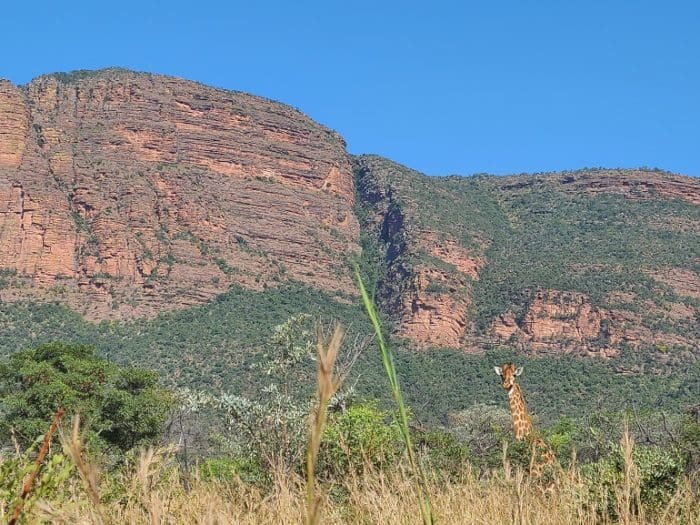
Yet another lifelong dream box checked, we continued down the path. We spotted the first small herd of zebra ahead, and a familiar tune began to play.
Before we could get up to them, the zebra herd co-mingled with a large group of giraffe. The giraffe remained still, staring at George and me as we walked closer. Unlike before, the zebra didn’t bolt right away. This time they trotted back and forth, crisscrossing each other, weaving among and through the giraffes. I was about three second from having a strobe-induced seizure when George called out which zebra to shoot.
“Not a chance, George.”
The stallion simply didn’t stop. He didn’t even slow down, and tracking him through my scope and taking a shot that wouldn’t wound either a second zebra or a giraffe just wasn’t possible. I just couldn’t take an ethical shot from there. George agreed.
We re-positioned, but managed to simply scare the herd deeper into the brush. We took a break and made a plan. Circling wide, we could likely move down the mountain a bit and come at this same small herd from a different angle. The brush got very thick and full of thorns, but the herd would likely keep traveling around the edges of it and not too far from water.
It took us some time to move around the mountain, and there were several times we had to get out and clear the path to get the truck through. But George’s plan had paid off. As the day was heating up, we spotted them again, well ahead of us and up against the brush line, exactly as George had hoped. George and I went off alone, leaving the truck and Mike well behind.
We moved slowly and quietly through the shoulder-high grass, to no avail. The zebra spotted us and ran. This particular dance was getting old and I had already gotten my fill of it down on the plains.
But unlike below, these zebra didn’t run far. A few hundred yards away, as soon as they were out of sight, they slowed down, trotting back and forth in another small clearing ahead of us and to the right.
George had his binoculars up and whispered “The stallion’s the last one to the right, back of the herd. Good one.”
The tall grass and trees were too much of an obstacle to get a good shot at this distance, especially at a trotting target, so I went back to the path and hurried forward in the hopes of putting the stallion directly between my rifle and the brush line. George hung back, keeping his eyes trained on the target.
My path would cut through two large groups of tightly-packed bushes, with just enough space between to fit a small truck. To the left of the bushes was a large field. To the right was a small field and the herd.
My plan was simple enough. If I could make it another 50 yards, between those bushes, I could use one as cover to get in a shot, less than 100 yards away, on that stallion. Moving as they were, sandwiched between George, me, and the brush, I was bound to have a clean shot sooner or later.
I crept forward. By now I knew what the sound of thunder in the mountains meant. It meant my plan failed. The zebra had decided to make a break for it, and now were running flat out in one long string toward George. Maybe they had seen me. But then, maybe they saw George, because they wheeled, reversing direction completely.
They were now less than 100 yards immediately to my right in one continuous string, absolutely flying through the tall grass. I had no idea which zebra to shoot, or even where one zebra started and another stopped.
As they raced past, the lead animal took a turn for the big field to my left. I saw her through the window of the path in front of me as she brushed the small group of bushes I was heading for.
George must have realized the same thing I did. The whole herd would follow. He called out, “LAST ONE!” as I took a knee and brought the singe shot magnum up.
Hooves. Dust. Stripes. A thought.
“Which one is the last one? I won’t know until it’s gone.”
George’s voice: “NOW!”
Thirty yards away, there were stripes in the glass when I pulled the trigger. I knew it was a hit.
At least, I knew I hit something striped. I pulled the two pound Jard trigger the moment I saw the stallion’s chest. At that range, the only question was how far back on the animal the round had struck.
I found blood in the middle of the path in the shadow of the bushes. I found more — a lot more — just a few yards to the left of the bushes, toward the big field the herd and fled to.
In the field, the herd was gone. One remained.
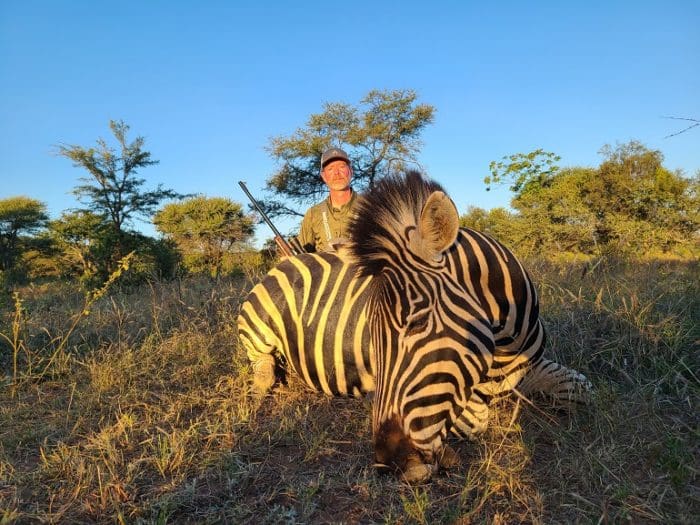
Forty yards from where he was hit, the stallion lay still. Within moments, he was dead.
Zebra tenderloins for dinner.
We’ll be landing soon. Just like my last trip to South Africa, I have absolutely no intention of hunting a zebra.
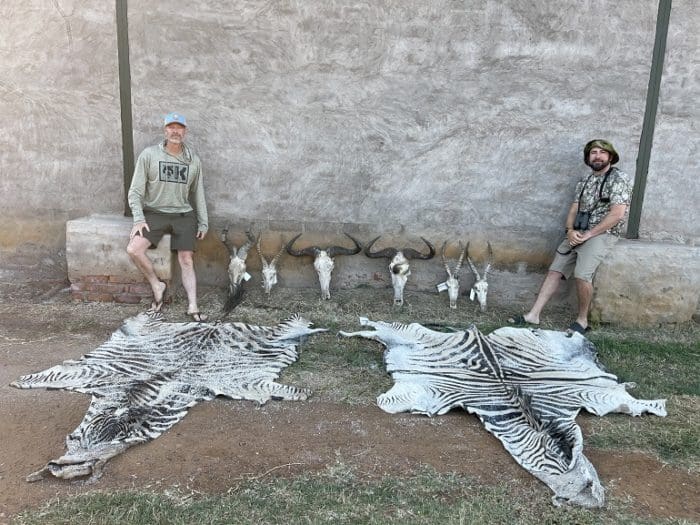

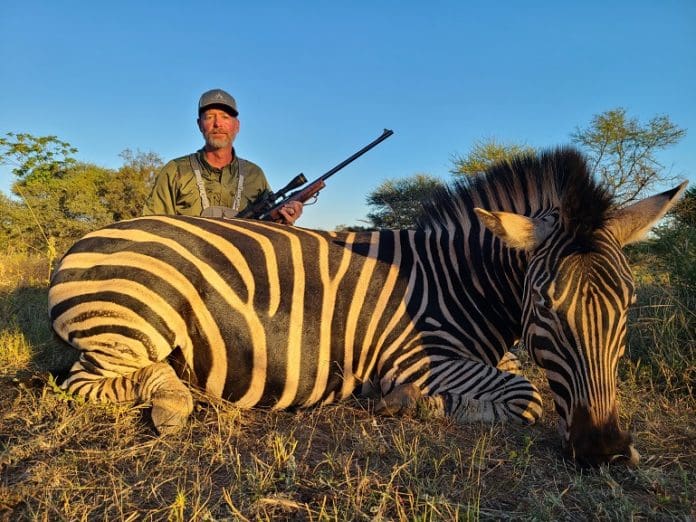

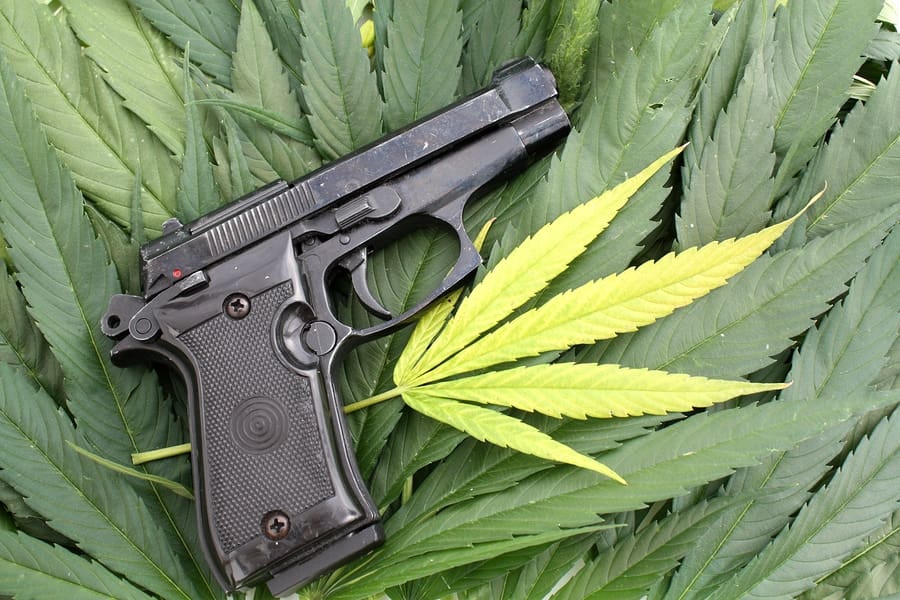
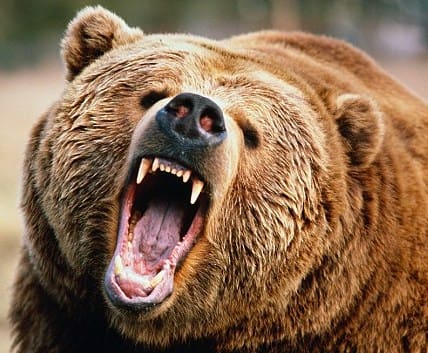
‘You want to hear God laugh? Tell him your plans.’
As for a Zebra. (Full disclosure: I’ve never been to Africa.) That’s a mule with an exotic paint job.
Zebra is a mule dressed up like a pimp.
Youve got it backwards. A pimp is a hairless ape dressed up like a zebra.
Come to Africa.
Excellent article, with superb photos. I appreciate this submission, JWT.
My late grandfather (a master rifle huntsman) told me stories of his (domestic) excursions, and one in particular came to mind that highlights his attempt to educate me on the importance of cartridge selection and humane shots. I had asked why he had so many rifles in so many calibers, and he said an improper cartridge (over or under powered) or ballistic distance to the target (too close or too far) is actually cruel to an animal. A conscientious hunter wants to put down his target game as quickly and humanely as possible. To illustrate this, he told me of a time when he placed a perfect shot right through an elk’s heart. Even so, the adrenaline in the beast’s bloodstream was enough to allow it to run an incredible few hundred yards before finally dropping. When he reached the carcass and field dressed it, he discovered that his shot was so perfectly on target that the heart had been shredded and mostly pulled out through the exit hole by the (assumedly well mushroomed) bullet. If he had chosen a different cartridge or taken an inferior shot out of impatience, the elk would likely have (at best) died more slowly or (at worst) run off with a painful wound.
That was back when I was in my 20s. I’ve remembered that lesson all my life, and is why I also keep a range of rifles in different chamberings.
My father, grandfathers and uncles all had a hand in my shooting and hunting training. Outside of safely handling a weapon they most strongly taught that if you hunted you owed it to the animal to kill as quickly and as cleanly as possible.
They referred to folks that were not up to that standard as ‘slob hunters’.
I think it would be singularly thrilling to experience a hunt like the one you eloquently describe here- but to take the shot with a high performance paintball cartridge. This way, the only thing missing would be the killing of a majestic, untamed. exotic and powerful living being.
The paint marker would prove the skill of the hunter, and the quiet, gentle animals would not have to endure its sprit outliving its body after running several hundred yards with their heart torn to bits. Seems like a more respectful way to hunt a horse “of a different color”.
Simply my perspective, though- I appreciate JWT’s expertise and thoroughly enjoy reading his contributions here on TTAG.
That delicious hamburger that you just got done with didn’t come from a volunteer, and the calf that watched mom get loaded onto the truck thought highly of her, also. For each game animal taken humanely like this, I wonder how many are lost to lions, or worse a slow death by hyenas, etc. Not trying to be a dick, but no need to add fuel to the antis torches.
Sadly it takes an outsider. Because it’s against the law for locals to do it. Coming from over 10,000 milies away, to stop any animal from eating children. Bears and mountain lions do that here in North America. But any average person can go out and legally kill that Apex predator.
Most time the cow stays and the calf gets hauled off. Mom bawls for about three days then finally shuts up.
Thank you, and I always appreciate your respectful critique. I’m sorry I have not been able to reply sooner, but I have been traveling and out on patrols in the bush.
I know it’s difficult to understand, but your suggestion of shooting them with paintballs is somehow rude, not to the hunter, but to the animal. More rude than shooting them? Yes. Shooting them with paintballs turns hunting into some kind of sport.
To the hunter, it would be a game. But the zebra only knows life or death. This would trivialize the animal, trivialize the act, and only serve to further separate the hunter from the natural world. This is the antithesis of why we hunt.
I think I would be lauded as a great philosopher if I was ever able to truly explain the need for humans to hunt, as no one has successfully done it yet. But do consider that, at least for some of us, the need is there. And it is an old need.
The very first piece of art ever recorded is on a cave wall. It is of a single man hunting an antlered animal. That wasn’t about survival. He didn’t paint water or fire or any of the plants that he must have foraged. He didn’t paint his family. He didn’t paint the animals he had to protect himself from. He painted the sacred hunt.
As a slight aside, and maybe a personal explaination to help you understand how different humans can be from each other, I very much enjoy butchery. If it made any real money I’d make that my vocation. But I have been a vegetarian before, and if I had to eat solely off of commercial meats and foods, I would be one again.
Having a background in Philosophy, I have always had an innate passion to “understand”- and thoughtful discussion is a superlative means to that end (and it is eternally appreciated, JWT). My current perspective on hunting is the result of decades of personal experience with animals and humans- but it is merely my own personal viewpoint.
The first animal I shot was with my Crosman Pumpmaster 760, I was in grammar school at the time and I hit a Blue Jay in my back yard… and the bird flew off. I then put the crosshairs of my Tasco scope on the head of a Cardinal in an Azalea bush and, “THWAPP”… the bird fell fluttering to the ground.
I was surprised when it continued to frantically flutter all over the ground in a cloud of dust and feathers. By the time I got over to it, it had stopped fluttering and lay there appearing to be taking slow, convulsive gasps for air. That’s when I noticed that I had indeed hit it square in the head- the pellet had cleanly taken the top of the bird’s skull off. Although grievously wounded, the bird was still copiously alive… it was gruesome. I never put that pellet rifle’s sights on a bird again.
I did take a bead on a squirrel high up in a Sycamore tree in my front yard about a year later- and I found my mark then, too. The squirrel slumped immediately, fell off the branch, and landed about 30 feet below in the yard with a deadening “thud”. At first, I felt the rush from hitting my target and seeing my prey neutralized. I gazed at my prize for a minute or two from the second floor window from which I had taken the shot before realizing I had to go down there claim my prize. Just as I was putting the Crosman down on the bed by the window, my eye was caught by movement high up in the Sycamore tree- it was three or four baby squirrels looking for their mother.
I never shot another living being with that Pumpmaster.
In middle school I did some Dove hunting with my J. Stevens single shot break-action hammer 20ga my parents bought me at Sears (in the good ole days), and I enjoyed some success with that. I never got used to twisting the doves heads off, though. And after getting my first girlfriend, the urge to hunt animals just seemed to fade away. I’ve had no interest in killing anything ever since.
Speaking of human experiences- I clearly remember wandering into the back yard to see what my older brother and his friend from down the street were doing one afternoon (I was probably six or seven years old). I found them gleefully throwing live frogs as hard as they could at a cement block. Shocked, I asked them why- “to watch them come apart” was the response (with laughter). “What are you, a wuss?!” is what I heard when I turned around and went back into the house. I consider this experience my first real glimpse into the endemic, pernicious nature of testosterone. I’ve never forgotten it, and it certainly wasn’t the last glimpse.
In high school we’d spend summers at the beach, and we loved going seining with a long net just past the breakers. Blue crabs ended up in a pot on the stove, small fish were thrown back, edible fish were kept for eating (Flounder, Cobia, Pompano, Mullet, etc.), and it was not uncommon to net juvenile sharks (Blacktip, Sharpnose, Hammerhead, and Sandbar mostly). But it was how people reacted to these helpless live animals is what affected me.
I was always in a hurry to get the “throw-back” animals back into the water- I didn’t want to watch them needlessly suffer. I didn’t volunteer to clean the keeper fish because it was inherently off-putting to me- I found it unappetizing to eat an animal I’d recently disemboweled. I also didn’t much care for the “shrieking” sound crustaceans made when they’re thrown into a pot of boiling water, but it was worth it considering how delicious the end result was- yum (plus, they’re kinda more like spiders or bugs than anything else).
But I’ll always remember the individuals who seemed to enjoy watching the animals writhe while gasping for oxygen helplessly out of their element on the beach. I never understood the desire to witness an animal die a painful death, but it seemed rather natural for many folks. And much worse- the guy who was so excited by the baby Hammerhead- he promptly grabbed a knife and proceeded to perform a “half-ass autopsy” right there on the beach… quickly, before the shark died. I watched him yanking out organs and shoving his fingers into them- when I asked him why he was doing that and he nonchalantly replied “Why not- it’s a shark, and it’s fun!”. More testosterone-driven primate humor, I guess.
So, JWT, I guess I’m trying to get across that I am very aware of the human “need” to hunt- I have felt it myself. But when I take a step back and objectively evaluate both my personal feelings and having witnessed the impulsive actions of others- my perspective changed. I started asking myself “why?” Do I have a choice in acting on these urges, does this behavior create unintended consequences in other aspects of my life? I started thinking about the arguments people make about humans being distinctly different from “animals”- and why that is. Is it he ability to reflect, to have empathy, to choose discernment over impulse- is that what makes humans different? Real Garden of Eden stuff here- consciousness, conscientiousness, free thought, free will… you know, those “little” questions humans sometimes ask themselves (and each other). Can we only consider ourselves “human” when we choose to contravene our baser instincts? Are we animals if we don’t. Or should we just be mindful of ourselves…
I do not claim to have the answers- I believe life is an ongoing search to find one’s truth and that takes utilizing one’s abilities to their fullest and keeping an open mind. Anyone who hasn’t found themselves proven wrong (multiple times) and accepted as well as learned from our mistakes hasn’t truly learned anything. I participate here on TTAG because I learn from others- and I sincerely hope that others learn from what I have to say, too…
So you snuck up on a horse and shot it? Stunning and brave.
Your envy is showing.
yeah, i forget to zip up alot.
kick ass hunt (spoonerize that one) story, i was briefly immersed.
So…. TLDR?
his synopsis is accurate minus a plethora of details.
Yes but he shot “Ole Glue Bucket” theres no out to pasture in Africa.
Or anywhere else in nature, to be truthful.
Congrats JWT, excellent read.
“Yes but he shot “Ole Glue Bucket”…”
I have to say, next to bitch-slapping my autistic troll just for shits-n-grins, it’s the puns that sneak up on you that gets the biggest laughs outta me.
“Ole Glue Bucket”… *snicker* 😉
JWT, you truly are “Living the dream”.
Thanks for inviting us along on that hunt…
A horse and zebra are about as related as a human and a chimpanzee.
I know horses. They can be unpredictable at the best of times. Zebras are this on steroids because of their natural harsh and predator filled environment.
Even feral goats and pigs can be challenging to hunt as they are much more wary than their domestic counterparts.
“…as they are much more wary than their domestic counterparts.”
Natural selection at work. The non-wary ones tend not to survive long enough to breed…
And I have spent half my life with horses- they are wonderful creatures (big, stupid dogs is how I describe them). And, like dogs, I would never consider hunting them- especially for fun, or sport, or for the “thrill”. As I wouldn’t hunt chimpanzees, or primates (unless one was trying to kill me), or goats, or pigs for “fun”, or to simply kill something.
Hunting for food to survive- sure. Hunting to stop predation, to defend life, for conservation, etc.- no problem. For me personally, though, taking the life or another being simply for my own personal pleasure is… unappealing.
However, I do recognize that everyone has their own code of ethics, and I will defend others’ right to act accordingly (unless the behavior evolves into manifest cruelty). Honestly, if I had to kill and dress meat myself I’d become a close-vegetarian and occasionally consume poultry. But that’s just me.
Back in my younger days I learned to ride classic style and to ride properly. I worked at a riding school and practiced the lessons while taking the trail groups out. I can still pick faults in technique when I see casual riders. I’ve had gaps of more than a decade where I picked up the skill in a few minutes.
I agree horses are like dogs and are certainly as smart as dogs. The mischief bored horses can get up to is surprising. Horses also are smart and can be curious but others can be a scared of their own shadow. Horses can read the rider through the saddle and school horses know who’s in charge. Often it is not the one on top.
The school had me use a horse who was infamous for throwing riders. I had him under control in a few weekends. He tried to “pig-rut” me but I felt him tense his back muscles and pulled him up. We ended up being a good team as I would work with him and not force him to do things.
My siblings and I showed horses (Hunters/Jumpers) all over the Eastern Seaboard (from Miami, FL to Lake Placid, NY) from the 70’s thru the 90’s. I have ridden ponies in Hyde Park in central London, and even had cavallettti training at an indoor Dressage ring in Vienna. I literally grew up with horses- they were some of my best friends (I even joke that I was raised in a barn).
As I’m sure you are also aware, Southern Cross, I quickly learned that a rider can read what a horse is thinking by watching his/her ears- their thoughts and intensions translate directly through their ears. It at least gives you a slight hint of what’s about to happen… (my first broken bone was when I jumped a fence that the horse didn’t).
Equines are indeed a majestic breed.
I’m afraid you weren’t paying attention. I failed to sneak up on it, and then I shot it.
Not a hunter; definitely wouldn’t fly half around the world to get all sweaty and dusty; however……
Enjoyed the article, fully. The presentation was as good as I have read in any hunting magazine, or in a book describing a hunt.
Bravo Zulu
Not a hunter? So that was a crop duster you were flying?
“So that was a crop duster you were flying?”
We called ourselves “rock hounds” and “distributors of heavy earth mover equipment”.
Yes. I saw your types over my head a few times.
I still hate helicopters. Guess I’ll never out grow that.
Thank you JWT. Your hunter dollars are helping the local economy in Africa. And are you doing what hunters do best, performing conservation. You are helping the local people far more than most NGO’s.
I support hunting as I realize you help the locals quite a bit. The idiots who want to ban hunting must prefer dying after they hit that giant rat er deer on a backroad. My ex wife hit one years ago and my son was a passenger. Everyone OK but Bambi is a Diznee movie!
I don’t know what the deal is, but I’ve seen more dead deer on the roads near towns this year than ever before. I even clipped one myself, but just barely. I think they’ve figured out how to stay in areas where people don’t hunt.
Excellent article, Sir. My compliments to your rifle.
It has performed admirably. I’ll let it know you approve.
How come no lions, , ?
Those Zebra hides look pretty.
If I go to Africa I’m dressing up like Tarzan and ride elephants.
$50k+, and from what I’ve seen so far, the lion isn’t much of a hunt.
Great story, and great hunt! I would love to try some zebra some day.
When I go to Africa I’m going to dress up like Tarzan and ride elephants .
Tarzan? No. Cheetah? Yes.
This comment was moderated. WTF?
Yep. Take the hint old man.
TM, showing disrespect to your elders is a sign of a poor upbringing. You insult your parents and grand parents when you do so.
Why do you hate your parents?
“Why do you hate your parents?”
He hates them because they always kept pounding on the bathroom door while he was in there for hours frantically yanking it.
The beating he got for so much beating off is the root of his hatred for his mother… 🙂
My post was yanked too. Maybe sophomoric humor, or maybe because of the link. I’ll try a different angle.
“…I’m going to dress up like Tarzan…”
This brought to my mind a video clip, which can be found by searching utube for the following:
QGgWhH5rwg0
“…I’m going to dress up like Tarzan…”
Now why did this clip come to mind?
https://www.youtube.com/watch?v=QGgWhH5rwg0
@jwm
“I still hate helicopters. Guess I’ll never out grow that.”
Roger that!
There is a reason Da Vinci’s invention was lost for over 600yrs. Only wanted to see helicopters if they were inbound to extracting me from the jungle, or the sea.
Choppers just meant more trouble. Haven’t been on one since.
“Choppers just meant more trouble. Haven’t been on one since.”
Saw them drop in by the dozens at Da Nang, TET ’72. And the RNAF just walked away, leaving the birds scattered all over the ramp.
Sam – Did you refer to your tankers and bombers as ‘Mortar Magnets’?
LOL… a possum in a loincloth on top of an elephant. Makes me think of the Brit comedy show…” Possum’s Flying Circus”.
Please submit an article with lots of photos when you do.
PS: Enjoy your African Travel stories immensely…please keep them coming. Really interested in reading how your training with the Wardens goes. Do they have tourniquets and clotting dressings / bandages available?
They are sorely needing those supplies and even the ones mailed into the country are often stolen before it gets down to the troops that need them. Fairly familiar story around the world. I brought two big duffels with me full of supplies. It’s been interesting, and tiring so far. The work is done day and night and I am too old for this shit. That said, I’ve seen every kind of cat, up close, big and small, during the nights.
I always assumed the danger of being eaten by wild animals in southern Africa was pure exaggeration. It is not.
My daughter’s company sent her to Argentina for 2 years. Officials had to be bribed at every turn for normal services.. Packages had to be bought out of customs.
She loved the country in spite of this.
That was some great writing right there, from TTAG’s own Robert Ruark. Well, maybe better that Ruark, since Ruark could never succeed at being funny.
Thanks. Ruark trying to be funny is funny.
“TTAG’s own Robert Ruark”
That might be a puzzling reference to a host of visitors to/at TTAG. My dad had “Something of Value” in his bookcase. I remember as an eight year old, looking at the dust cover art, and wondering what it was all about. Tried reading the book at about 11, but without any adult experience in anything, found the book difficult to follow; never quite finished it. Then life happened, and I never returned to the book.
Ruark was more than a novelist, He was also a famous hunter who is especially known for his African hunts with Harry Selby. Ruark described these hunts in books and magazine articles. While all his African hunting stories were gripping, Ruark’s attempts at humor always fell flat (for me at least).
@Geoff “A day without a demented troll is like a day of warm sunshine” PR
“Sam – Did you refer to your tankers and bombers as ‘Mortar Magnets’?”
Are you talking about aircraft on the ground in combat zones? Not familiar with the term.
We did have the following (ranked in relation to the then existing caste system):
Bomber Pukes
Tanker Toads
Missile Weenies
During “the war”, bombers and tankers were housed (Thailand, Guam, Okinawa) outside the combat zone; missiles stayed home to protect the women and children.
My concern, my concern is, and this is germaine If I may. It’s my concern with Alaska floating off the coast, a coast is like a beach, floating off a beach of California and then sometimes on some maps, in the, a gulf, a gulf is not a beach , the gulf of Mexico, it’s my concern that Alaska may crash, collide into an island, Cuba,Cuba is an island, My concern is Alaska, may crash, collides, crashes into, it may form ,it may cause, Alaskan people, Alaskan people are Eskimos, to become addicted, addicted, needing to have, it’s my concern Eskimos may , Eskimos live in Alaska, Alaska isnt that far from Cuba,it’s my concern Eskimos may become addicted to cigars, cigars are like a large cigarette, a cigarette without paper, it’s my concern with to many Eskimos smoking cigars on Cuba it will become, become to heavy with smoke , to be aware off, it may become to heavy with Eskimos and smoke , it’s my concern, Cuba may, may, not the month before June, become to heavy with smoke and whales , whales and Eskimos , my concern is Cuba may capsize, with nothing stopping Alaskas drift it may, my concern is it may collide, crash, form with Florida ,and become a part of the United States.
“Are you talking about aircraft on the ground in combat zones?”
Yep, my dad tells a tale of him emergency evacuating one of his squadron’s Hercs while under fire. Got it off the ground, pulled up the gear and built some speed while about 15 feet off the deck. Only popped it up when approaching the treeline. All while the base was under a mortar barrage. A few on the ramp were burning.. He said the wing tanks on the Hercs seemed to attract to attract mortar rounds…
“He said the wing tanks on the Hercs seemed to attract to attract mortar rounds…”
Buffs might more easily fit into the category of “missile bait/magnets”. I only know of one instance where a Buff took off from a base subject to attack (Da Nang). That bird had battle damage from a sortie in North Vietnam, and made an emergency landing at Da Nang for repairs. Da Nang did not suffer rocket attacks while the Buff was parked, or when it departed.
Jon, thanks for taking the time out from your adventures to write this story, kinda felt like we were in the back of the truck with you. It sounds like you are still there while responding, so good luck with the rest of your endeavors !!
Great story! Well-written, funny, pathos, and in Africa!
“HUAYDED789 หวยออนไลน์ 24 ชั่วโมง ระบบที่ทันสมัย แทงหวยง่าย โอนเงินไว หวยออนไลน์ที่นี่จ่ายสูง ส่วนลดเยอะ โปรโมชั่นพิเศษสำหรับสมาชิกใหม่ และสิทธิพิเศษมาก มาย แจกเครดิตฟรีอย่างต่อเนื่อง”
หวย อันดับ 1 มาแรงแซงทุกเว็บ
เว็บพนันออนไลน์ เว็บตรง ไม่ผ่านเอเย่นต์ฝาก-ถอน รวดเร็ว ด้วยทีมงานคุณภาพ ตลอด 24 ชั่วโมง มีความยุติธรรมและโปร่งใส ไม่เคยมีประวัติการโกงลูกค้า
Comments are closed.